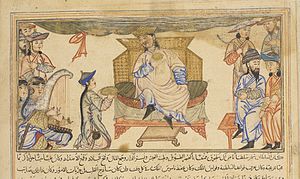Sultan Sanjar
| Ahmad Sanjar | |
|---|---|

Ahmad Sanjar seated on his throne.
|
|
| Ruler of Khorasan | |
| Reign | 1097-1118 |
| Predecessor | Arslan-Argun |
| Successor | Kara-Khitan conquest |
| Sultan of the Great Seljuq Empire | |
| Reign | 1118-1157 |
| Predecessor | Muhammad I |
| Successor | None |
| Born | October 1086 Sinjar |
| Died | 8 May 1157 Marv |
| Consort |
Turkan Khatun Rusudan Khatun |
| Issue | Mah-i Mulk Khatun Amir Sitti Khatun Gouhar Neseb Khatun |
| House | House of Seljuq |
| Father | Malik-Shah I |
| Religion | Sunni Islam |
Ahmad Sanjar (Persian: احمد سنجر; full name: Muizz ad-Dunya wa ad-Din Adud ad-Dawlah Abul-Harith Ahmad Sanjar ibn Malik-Shah) (b. 1085 – d. 8 May 1157) was the Seljuq ruler of Khorasan from 1097 until in 1118 when he became the Sultan of the Seljuq Empire, which he ruled as until his death in 1157.
Sanjar was born in ca. 1086 in Sinjar, a town situated in the borderland between Syria and the al-Jazira. Although primary sources state that he was named after his birthplace (Rāvandi, p. 185; Ebn al-Jawzi, XVIII, p. 161) Bosworth notes Sanjar is a Turkic name, denoting "he who pierces", "he who thrusts". He was a son of Malik Shah I and participated in wars of succession against his three brothers and a nephew, namely Mahmud I, Barkiyaruq, Malik Shah II and Muhammad I. In 1096, he was given the province of Khorasan to govern under his brother Muhammad I. Over the next several years Ahmed Sanjar became the ruler of most of Iran (Persia) with his capital at Nishapur. A number of rulers revolted against him and continued the split of the Great Seljuq Empire that had started upon dynastic wars. In 1102, he repulsed an invasion from Kashgaria, killing Jibrail Arslan Khan near Termez. In 1107, he invaded the domains of the Ghurid ruler Izz al-Din Husayn and captured him, but later released him in return for tribute.
...
Wikipedia
